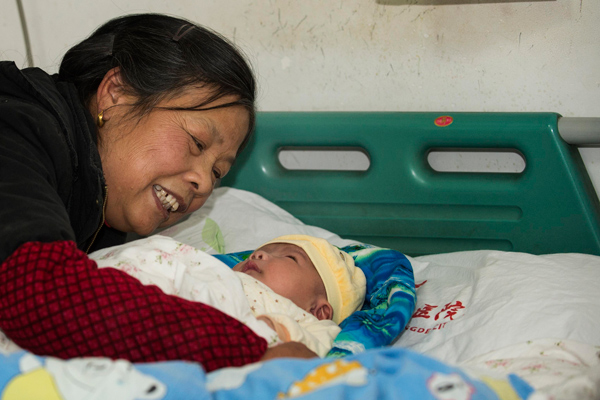

450,000 shots pulled though authorities are yet to confirm link to adverse reaction.
 |
|
A grandmother smiles after her grandchild, who had developed adverse symptoms after being vaccinated for hepatitis B, has responded to treatment in Changde, Hunan province, on Thursday.[Xie Changgui / for China Daily] |
China's top drug administration has suspended two batches of hepatitis B vaccine from use after the suspicious deaths of two babies last week.
The batches of vaccine, totaling about 450,000 shots, have been suspended from use pending further investigation, although officials said no clear link between the deaths and the vaccines has been established.
Two babies, aged 8 months and 1 month, from Changning and Hengshan in Hunan province died soon after being given the vaccine. One died one day later, while the other died three days later.
The vaccine was manufactured by the Shenzhen-based company Biokangtai. It has been producing the vaccine since 1994 and now has more than 50 percent of the total market share on the mainland.
The Hunan Provincial Center for Disease Control and Prevention has been conducting investigations into the deaths.
Gao Lidong, deputy director of the center, told China National Radio that preliminary investigations have discovered no direct link between the vaccines and the babies' deaths.
"We are exploring more factors, such as whether the procedures for administering the vaccines were properly practiced," he said.
Gao revealed that another 1-month-old boy, from Hanshou in Hunan, also became ill after being injected with the Biokangtai vaccine.
The baby was saved by timely intervention and is now under observation at a hospital, he said.
Meanwhile, an official from Hunan Food and Drug Administration who identified herself by her surname Li said on Sunday that it was still not clear whether the vaccine had killed the two babies.
"One baby was injected not only with vaccine but also with vitamin K," Li said.
"They didn't die directly after being injected with the vaccine. One baby died one day after the injection and the other died three days after. There may have been (other) problems in their treatment," she said.
On Friday evening, the administration issued an emergency notification to suspend the use of the vaccine.
"The autopsies on the two babies are still underway," Li said.
"If the results of the autopsies show that there is a problem with the quality of the vaccine, we will recall all of the vaccine that has entered Hunan province," she said.
According to the Shenzhen municipality drug administration, the incident involved two batches of vaccines, totaling 450,000 doses.
The administration has conducted an on-site inspection of the company and found no problems in production, said a statement issued by the administration Friday.
It also said the vaccines were found to have been sold to Hunan, Guangdong and Guizhou provinces.
In response, the China Food and Drug Administration, the nation's top drug authority, published a circular on Friday urging local authorities and disease control centers to suspend the use of the two batches.
According to the Shenzhen drug administration, the company does not have any more stocks of vaccines from the two suspect batches. Those sold to Guizhou have not been used.
Guangdong purchased 3,600 doses of the vaccine, mostly in Zhongshan and Guangzhou, and 190 of them have already been administered.
Guangdong authorities said on Sunday that 72 does were used in Zhongshan with no adverse reactions observed so far. The rest of the batch has been sealed.
Zhang Jiansan, executive deputy manager of the vaccine company, told Southern Metropolis Daily in Guangzhou Saturday that the two batches were produced last year.
He said that an internal investigation had revealed no problems in the key areas of manufacturing, storage and transport.
Since the hepatitis B vaccine was included in China's national immunization program in 2002, all Chinese babies have been given the vaccine free of charge.
Largely due to the program, the hepatitis infection rate among children under 5 years of age has been reduced from 10 percent to less than 1 percent, according to a World Health Organization report published in July.
Hou Liqiang and Li Wenfang contributed to the story.